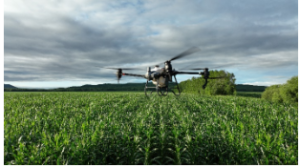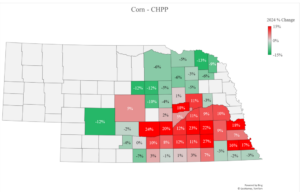
At the end of 2018, the news was the government shutdown caused by the impasse between President Trump and Congress over the Trump Administration’s demands for $5 billion to construct and repair portions of the border wall with Mexico. During the same period of time, the trade war with China was also growing in importance with both the manufacturing and agricultural industries, but there was hope that by March 2019, a deal would have been struck between Trump Administration and China to avoid the escalation of tariffs. By early March, it was evident that these talks were stalling, but there was still hope.

Then…. Mother Nature struck hard at the Midwest with unprecedented blizzards, downpours and flooding that has continued to devastate millions of acres of ariable land and has effectively prevented thousands of farmers from planting their acres. As of the middle of May, nearly half of the crops that are typically planted by mid-May were still unplanted, leaving many farmers considering exercising Prevent Plant insurance options, which barely covers or doesn’t cover overall expenses. Today, many of the same farmers who faced flooding in March and April are now facing additional flooding, which is either preventing them from planting a crop at all, or has destroyed the crops that they were able to put into the ground between the floods. Politicians and scientists alike are attributing this catastrophic weather event to climate change brought on as a result of global warming and greenhouse gases. But remember, the Trump Administration pulled out of the Paris Accord, downplaying the threat of global climate change and relaxing pollution restrictions on American industries.
Today, not only have the trade negotiations with China been uneventful, the failure of which has caused irreparable damage to the U.S. agricultural markets, as evidenced by the drop in prices during late April and early May, but now we are seeing similar threats being made towards our largest trading partner… Mexico. While Mexico does not have the same amount of leverage as China, the worlds second largest economy only behind the United States, Mexico is the largest market for U.S. agricultural products. This has Congressional Republicans and Democrats in Congress revolting against Trump, threatening to veto any tariff programs implemented against trade with Mexico – and Congress may just have its way against the Trump administration.
However, there are a few secondary impacts that will most definitely be felt within the agricultural industry; eventually making their way to the shelf where America buys its food… LABOR.
In my opinion, implementing hard policies against immigration prior to reforming and establishing better immigration policies is putting the cart before the horse. With the unemployment rate in the United States being only around 4.5%, there is a big demand for skilled and unskilled labor. Most of this manual labor has been filled by the hands of immigrants who are eager to grasp at a better life by earning an income by adding value to the U.S. economy. Most of these immigrants are legally within the United States, whereas there is also a large number of these immigrants who are undocumented, yet allowed by previous administrations to live and work in the United States while pursuing proper documentation. By implementing a hard core stance against these undocumented immigrants, the Trump administration has effectively put a noose around the labor supply which has provided many industries with low cost labor, which has translated to low cost services and goods provided to the American consumer for many years.

Now, enter into the picture the macro-economical law of supply and demand. The greater the supply, the lower the demand – reducing cost. The lower the supply, the greater demand and greater cost. What does this mean?
By implementing harsh immigration laws, tariffs against Chinese, Mexican and other international goods, and with a greatly reduced supply of cheap labor, the inflation of prices of services and goods within the United States is inevitable. The American consumer will quickly find that, due to the rapid implementation of these policies by government, coupled with lack of ramping up domestic production capacity, shortage of labor, and a general lack of long-term thought into the same policies, the same wage that currently covers basic goods may no longer cover the same lifestyle in the very near future.
The weather itself has also been a double edged sword. While the incredibly wet spring has caused this, and last, years’ commodity prices to rise to levels not expected this year, the heightened prices have been relatively short lived. These heightened prices allowed farmers to offload a large portion of last year’s harvest, but this may not be enough to cover the losses caused by the same weather severely the expected harvest this year. There has been some commentary regarding the Prevent Plant program, but even that program does not fully cover the production losses expected by many farmers due to the incredibly wet spring. Those farmers who were able to complete their planting in good time, and who have not experienced such difficulty in planting, will certainly be in better position come this harvest season. However, if the trade wars are either not resolved, or are heightened, American farmers may find themselves facing contracted international markets which have taken decades to establish, and may take decades to repair.
Certainly, the 2020 elections will be a very interesting, and dramatic, experience.
Please reference the following articles in relation to the topic on tariffs and immigration.
https://edition.cnn.com/2019/06/07/politics/mexico-tariffs-compliance-confusion/index.html
https://www.apnews.com/0a9d72722eec4c0ba6e45bb60890b63e
http://nymag.com/intelligencer/2019/06/trumps-mexico-tariffs-might-actually-work.html
https://www.ft.com/content/0b27bb22-8868-11e9-a028-86cea8523dc2
https://www.cbsnews.com/news/tariffs-on-mexico-ford-would-do-significant-damage/
https://www.cbsnews.com/news/tariffs-china-mexico-trump-could-hurt-the-u-s-economy/
https://www.thebalance.com/how-immigration-impacts-the-economy-4125413
https://www.businessinsider.com/trumps-deportation-agriculture-2017-2?IR=T
https://www.cbsnews.com/news/illegal-immigrants-us-jobs-economy-farm-workers-taxes/
https://www.epi.org/publication/immigration-facts/





